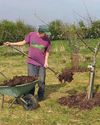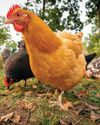
We’ve all experienced that dreaded moment when you go to make yourself a cup of tea on your allotment, only to find you have run out of tea. So why not grow your own and never run out in the future?
It will take a lot of care, a few years, and some good luck. However, it wasn’t initially Lucy George’s plan to become a tea grower on the family’s small farm seven miles from Cardiff.
She went to the Royal Agricultural College, Cirencester, where she took a course in business studies. It was never her ambition to become a grower, and when she left college she worked in the machinery business.
But then in 2002, her parents said they were going to retire and it was time for her to return home and run the family farm. Mostly, the farm grew soft fruit for pick-your-own and used it to flavour the ice cream production, a business that had been started by her mother in the 1980s.
However, she felt there was a need for diversification and to take a completely different direction that would give her a stability of income. Everything she had been involved with before had seemed to be seasonal.
Randomly, she admits, she came up with the idea of growing tea having researched it on the internet and found it was being grown in Scotland and Cornwall. She explains: “ I got a tea consultant in. I took the decision to grow from seed, but It is quite an expensive crop to grow. I got the initial seed direct from the former Russian state of Georgia, and also Nepal. Tea seeds aren’t that expensive. I bought 360 seeds to begin with. After that I was getting 20,000 a year over the next three years”.
BRING ON THE POLYTUNNELS
This story is from the {{IssueName}} edition of {{MagazineName}}.
Start your 7-day Magzter GOLD free trial to access thousands of curated premium stories, and 9,000+ magazines and newspapers.
Already a subscriber ? Sign In
This story is from the {{IssueName}} edition of {{MagazineName}}.
Start your 7-day Magzter GOLD free trial to access thousands of curated premium stories, and 9,000+ magazines and newspapers.
Already a subscriber? Sign In

How to Buy a Smallholding in France- Long-time smallholder Lorraine Turnbull looks at the practicalities of moving to rural France
Aspiring smallholders are continually thwarted by the prices of smallholdings and property with land located within the UK. Even the humblest croft in Scotland comes with a substantial price tag and conditions which would make even an adventurous wannabee consider carefully. But all is not lost. For those willing to take the adventure of a lifetime, there is always Europe, and one of the most popular places is France.

Meet the Bournemouth goats and their supporters
These capricious animals are hard workers preserving the natural habitat

Still warm enough to sit outside with a Pizza
Henrietta Balcon uses fresh figs to create an unusual dish at Harvest time

Goodbye to the birds of spring and summer
If you look and listen you might be able to see them preparing to leave says The RSPB

Get ready for the colder weather in the warmth of late summer
Claire Waring advises on doing the best to make sure your colonies survive until next spring

Preparing the Veg Patch for Winter
Lee Senior says, a well-run plot can excitingly continue to produce good quality, tasty, fresh food for much of winter

Time to prepare to plant your orchard
Wade Muggleton, smallholder and author of The Orchard Book, shares his practical experience so you can create your own fruit collection

Choosing feed for the autumn
As autumn approaches, Joanna Palmer, nutritionist at the Smallholder Range, offers advice on choosing the right feed to support your adult birds through their annual moult and ensure your young birds grow and finish well at this time of the year.

Vet advice from an experienced poultry vet
Reflecting on how much the humble hen has helped people world wide plus advice on stopping the scourge of red mite

Give your hens some support
Paul Donovan looks at the right and wrong ways of handling birds